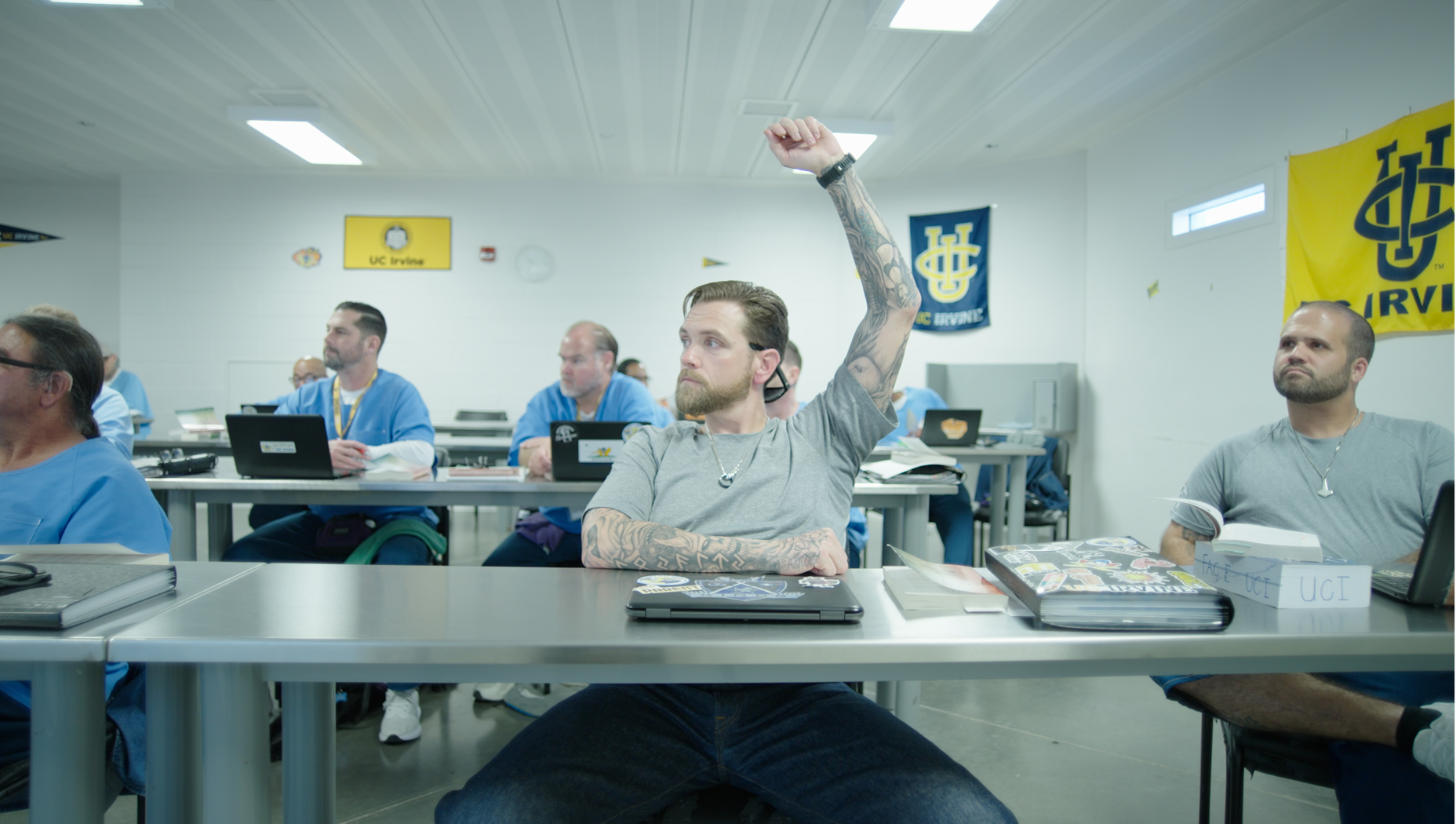
By Nikki Babri
Thinking of a prison setting, the image of incarcerated individuals reading novels like Frankenstein and The Yellow Wallpaper and engaging in deep literary discussions likely doesn’t come to mind. But at Richard J. Donovan Correctional Facility near San Diego, this is exactly what you will find students doing on any given day thanks to the UCI LIFTED program.
Uplifting all
Leveraging Inspiring Futures Through Educational Degrees (LIFTED) is the first in-prison B.A.-degree completion program within the University of California system. Launched at UCI, LIFTED offers qualified incarcerated individuals the opportunity to transfer into UCI as juniors and earn a bachelor’s degree in sociology – all while completing their sentence.
Directed by Keramet Reiter, a professor of criminology, law and society in the School of Social Ecology, the program aims to tackle the educational disparities prevalent among incarcerated individuals. Research underscores the transformative impact of education in reducing recidivism rates and equipping individuals with the skills necessary for reintegration into society.
“Education is the most effective rehabilitative intervention we know for people in prison. At least 95 percent of all prisoners will eventually be released, but many lack the tools to compete in today’s job market, let alone to pursue professional or graduate degrees,” Reiter explains. “Earning a UC B.A. degree opens doors, increasing public safety and economic returns. According to a recent RAND report, every $1 invested in prison education generates $5 in economic returns for society. Moreover, education is a powerful tool to mitigate the systemic discrimination and de-humanization of mass incarceration.”
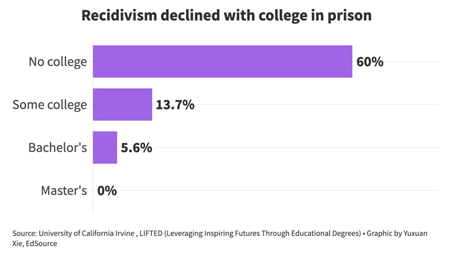
While 40% of released incarcerated individuals are expected to be reincarcerated within three years, studies show that those who participate in education programs have a 43% less chance of recidivating. The more education a person receives, the closer the recidivism rate approaches zero.
Reiter highlights LIFTED's unique approach, emphasizing its expansive scale and commitment to replicating an on-campus educational experience for incarcerated students. Students are given access to diverse electives, guest lectures within the prison setting and campus resources like the writing center and disability services. “We are making a world-class, research university-based education available to incarcerated students on a much larger scale than ever previously imagined,” she says.
The power of the humanities
The recent introduction of an English minor aligns with LIFTED's goal of providing students with a well-rounded liberal arts education. The English minor, in particular, acknowledges the pivotal role of literature and language in fostering critical thinking and expression.
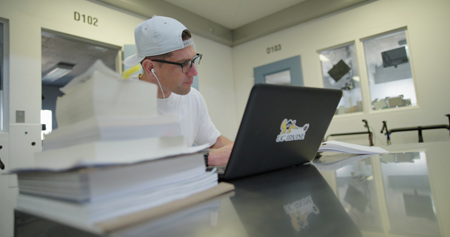
“As LIFTED seeks to expand, one of our major goals is to give students more choice in the courses they take as they earn their B.A. degrees. One way to do this is to expand opportunities for minors, and creating the English minor is our first step in this direction,” Reiter says. “English has been a critical partner in this initiative from the beginning, dedicating multiple faculty to LIFTED courses, and working with us to develop a transitional English course for students in the summer when they begin their transition to UCI. LIFTED students have loved these opportunities and we are thrilled to be institutionalizing this partnership with a minor,” says Reiter.
Following the Department of Sociology, English has the highest number of instructors teaching in the program, with the School of Humanities comprising one-third of all instructors. Those involved include current and emeriti faculty, lecturers and graduate students.
Associate Professor of English Annie McClanahan emphasizes the importance of offering humanities courses, such as English, to provide students with a comprehensive education. “It’s great to be able to provide a balance between the humanities and the social sciences. And it’s not just about ‘balance’ between English and sociology but also about collaboration,” she explains. “I have really encouraged my students to bring their understanding of social problems to their reading of literature, and to understand literature as a site where social debates, crises and changes get articulated and processed.”
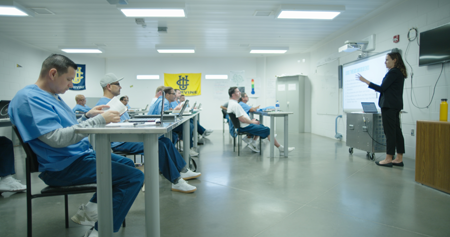
Certain texts and assignments have surprisingly struck a chord with students. McClanahan recounts teaching Charlotte Perkins Gilman's The Yellow Wallpaper, which resonated deeply with her students’ own experiences of incarceration. While the 19th-century gothic novella is renowned for its feminist themes, it also explores forced confinement and the implications of depriving a person of autonomy and freedom.
“The students immediately grasped both the feminist message and the story’s application to their own experiences of incarceration,” McClanahan says.
Creating community
As a former high school English teacher with a passion for literature, Richard Arum, professor of sociology and education, read many of the books McClanahan taught in the program this year. During a particularly memorable class session, held during a prison lockdown, he and McClanahan co-led a discussion on Kazuo Ishiguro's Never Let Me Go.
“Professor McClanahan noted the literary allusion in the work to Langston Hughes’s poem 'Harlem' that asks, ‘What happens to a dream deferred?’” Arum shares. “I found the discussion very poignant given that the students in our program are often pursuing their own joint goals of self-improvement and parole.”
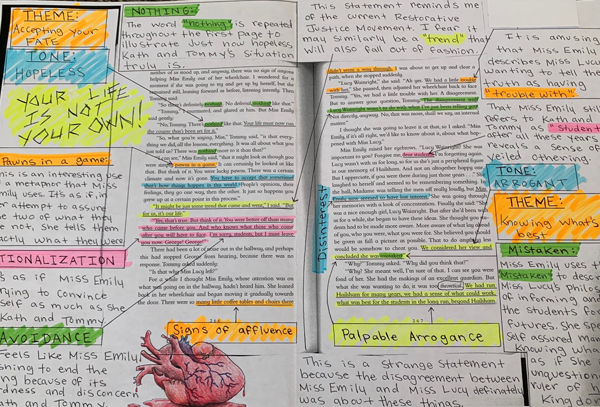
The novel, which questions topics including humanization, institutionalization and education, allowed Arum to connect the book to the conversations about higher education the students were simultaneously having in his course. In moments like this, McClanahan says, LIFTED feels like a model for the ideal college experience where faculty and students are talking together across disciplines, and using the particular affordances and insights of their individual discipline to supplement and expand the work of others.
The intimate size of the classes, Arum affirms, allows an educational environment reminiscent of small, private liberal arts colleges. “These sorts of programs allow faculty to know not only the students well, but also the other faculty and courses taught in the program.”
Similarly to his colleagues, Associate Professor of History David Fedman noticed how deeply his students related to the course materials. In the classroom, Fedman and his students grappled with the complex and often contradictory perspectives that incarcerated individuals within the California prison system hold toward the state.
A particularly impactful aspect of the course was the exploration of Japanese-American internment during World War II. “I've taught some version of this topic for over a decade now, but never have I seen students connect so deeply or write so compassionately about the incarceration of Japanese-American communities,” he shares. “My students’ insights into this dark chapter of California history have forever changed how I intend to teach and think on this topic moving forward.”
After completing her doctoral degree at UCI, Margaret Speer ‘22 (Ph.D. English), a lecturer in composition, began her teaching journey with LIFTED in the summer of 2023. Her first class focused on Mary Shelley’s Frankenstein, one of the most commonly taught novels in college English classes. “My students requested this text for that very reason – they are keen to get the ‘real’ college experience,” she says.
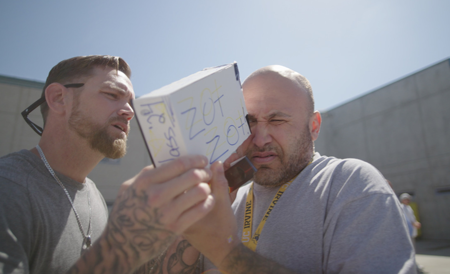
Speer highlights the unique continuity of discussion that arises from having the same class of students for consecutive courses, which has allowed her to build on topics taught in earlier courses. Currently, Speer is instructing a course that explores 20th- and 21st-century literature by writers of color and queer individuals who subvert the traditional Gothic genre and shed light on themes of white supremacist and patriarchal violence.
She admires her students’ dedication to rehabilitation, which is evident in their introspective discussions and commitment to personal growth. “My LIFTED students are incredibly strong and highly motivated. I feel really lucky – it’s every teacher’s favorite thing when their students are enthusiastic to learn,” Speer adds.
Successes, challenges and looking forward
The LIFTED program has reached significant achievements since its inception in 2022. Presently, UCI LIFTED serves 44 students across two cohorts, with 31 new students in the upcoming cohort. The program's success is evident, with 95% of students making the Dean's Honor List at least once since matriculation, a metric that rivals most on-campus classrooms.
Two students have been released and successfully transitioned from incarceration to campus life. Notably, six graduating seniors have been accepted into California’s first in-prison master’s program at CSU Dominguez Hills, which offers a Master of Arts in Humanities.

Beyond statistics, the profound human impact of education in prison is evident in the transformative journeys of students like Kelly McLeod, who shares the many ways education has given him purpose and made him feel valued. In-prison programming signifies community investment and care (often for the first time), which fosters a sense of support and belonging among prisoners. McLeod, who once couldn't imagine earning a B.A., credits education with boosting his confidence and opening his mind to new possibilities. “For the first time in my life, I believe I can accomplish anything I set my mind to,” McLeod admits.
Looking forward, Reiter outlined three main objectives for LIFTED: integration into the broader UC student support infrastructure, replication across other UC campuses and securing permanent state funding. Despite logistical and resource hurdles such as limited classrooms, restricted access to research materials and technological constraints, the program remains committed to providing the true UCI educational experience. Achieving a major milestone, LIFTED recently expanded to UC Riverside, which will welcome its first cohort this fall, and plans further replication across California.
On June 20, 2024, LIFTED will commemorate the achievements of its inaugural graduating class, underscoring their motto: “When they succeed, we succeed.”
Cover image: Chris Boyd, Diego City Media
If you’d like to donate to LIFTED, please click here.
Interested in reading more from the School of Humanities? Sign up for our monthly newsletter.
